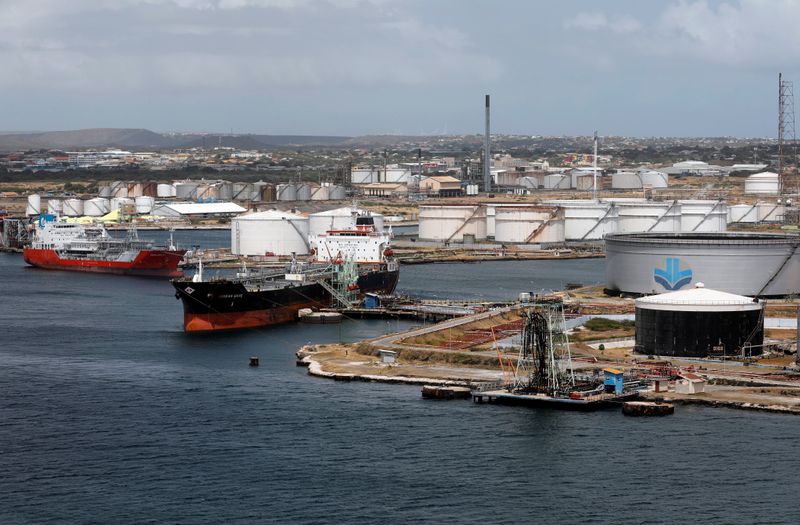By Marianna Parraga and Mircely Guanipa
(Reuters) - Pressured by strict U.S. sanctions, Venezuela's oil exports plunged by 376,500 barrels per day (bpd) in 2020, according to Refinitiv Eikon data and internal documents from state-run PDVSA, financially squeezing socialist President Nicolas Maduro.
The administration of U.S. President Donald Trump also put curbs on PDVSA's main trading partners, the owners of tankers still transporting Venezuelan oil and on fuel supply to the gasoline-thirsty nation.
The punishment, aimed to oust Maduro after his 2018 re-election was called a sham by most Western nations, has led PDVSA to pursue new customers, rely on mostly unknown intermediaries to resell its oil and deepen ties with Iran, another country under U.S. sanctions.
Venezuela's exports of crude and refined products fell 37.5% in 2020 to 626,534 bpd, the lowest in 77 years. The decrease was even larger for fuel imports, which fell 51% compared with 2019, to 83,780 bpd, according to the data.
The drop in the crude oil offer was several times that of the global market, which fell about 9% last year from COVID-19 constraints.
PDVSA did not reply to a request for comment.
AN UNSTEADY YEAR
Venezuela's oil exports swung wildly during the year, plummeting after Washington imposed sanctions on two units of PDVSA's main trade partner, Russia's Rosneft, and bouncing back when the Venezuelan state oil company found new customers and vessels to ship its oil.
For a graphic on Venezuela's monthly oil exports since 2019, click on: https://graphics.reuters.com/VENEZUELA-OIL/EXPORTS/xegpbqdzjvq
Sanctions led to series of subterfuges. Unwilling to be seen at Venezuelan ports, some vessels turned to 'dark voyages' or transporting the oil with transponders turned off, and PDVSA began using the names of scrapped ships to disguise the real identity of tankers loading at its terminals.
The United Arab Emirates, one of Washington's closest allies in the Middle East, recently has emerged as a hub for shipping firms helping Venezuela skirt U.S. sanctions in a move similar to what happened with Iran in recent years.
In December, exports of crude and refined products by PDVSA and its joint ventures dropped to almost 487,000 bpd, while fuel imports - crucial to feed gasoline stations as domestic refineries are barely working - plummeted to 7,500 bpd, the data showed.
INDUSTRY SINKS TO 1940'S LEVELS
The state-run company's inability to revive exports and its new dependence on imported fuel have sunk OPEC member Venezuela's industry to levels not seen since the 1940s, when it was boosting crude output while planning its first refineries.
PDVSA inaugurated the 310,000-bpd Cardon refinery on the west coast in 1947. The facility, along with neighboring Amuay, remain mostly idled due to lack of maintenance, parts and proper crude to operate.
The company also has been forced to match its crude output to the low export level, leaving heavy oil upgraders, important for making exportable crude grades, to work intermittently in recent months, according to the firm's documents.

Despite the sanctions' impact on the economy, Maduro has held onto power with the support of the military, and backed by Cuba, Russia and China.
